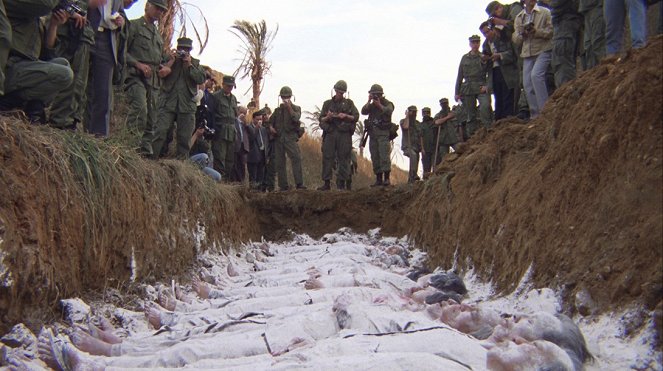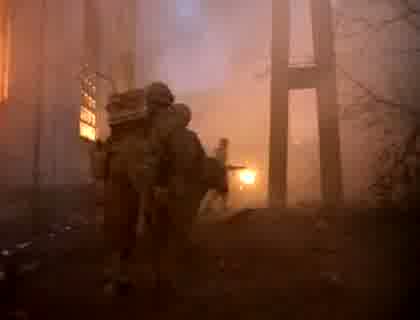Regie:
Stanley KubrickKamera:
Douglas MilsomeMusik:
Vivian KubrickBesetzung:
Matthew Modine, Adam Baldwin, Vincent D'Onofrio, R. Lee Ermey, Dorian Harewood, Arliss Howard, Kevyn Major Howard, Ed O'Ross, John Terry (mehr)Streaming (6)
Inhalte(1)
Nach einer brutalen Ausbildung wird der junge Marineinfanterist Joker als Kriegsberichterstatter nach Vietnam geschickt. Hier lernen Joker und sein Fotograf Rafterman den Zynismus kennen, mit dem aus blutigen Gemetzeln Medienereignisse gemacht werden. Aber als die jungen Männer bei verlustreichen Straßenkämpfen in Hue erstmals dem Feind Auge in Auge gegenüberstehen, merken sie, dass keine Ausbildung sie auf die Wirklichkeit hätte vorbereiten können ... (kabel eins)
(mehr)Videos (3)
Kritiken (14)
Ehrlich gesagt überrascht es mich nicht, dass Stones Platoon seinerzeit besser abgeschnitten hat... Kubricks Vietnam ist nämlich weniger attraktiv für das Auge des Zuschauers, urbaner (kein beengter Dschungel zu sehen), weniger actionreich, weitläufiger und breiter angelegt. Dennoch ist es beeindruckend, wenn auch für meinen Geschmack etwas distanziert und kalt. Die besten Teile des Films sind meiner Meinung nach der Anfang und das Ende - die Ausbildung der Marines besteht aus ununterbrochenem Gekreische des Ausbilders, nervtötendem Drill und dem Singen glorreicher Lieder. All dies in der traditionell einfallsreichen visuellen Präsentation von Mr. Kubrick (die Inspektionsszene mit einem Haufen Häftlinge auf Kisten, die sich die Nägel schneiden, ist unvergesslich). Die Schlussszene mit dem Scharfschützen hingegen ist die persönlichste und gibt allem, was wir bisher gesehen haben, eine ungeheure Bedeutung... ...und eine der drastischsten Szenen, die man in diesem Genre je gesehen hat. Am problematischsten an Full Metal Jacket finde ich die Figuren, die zu schematisch und unscheinbar sind, aber die schiere Absurdität und Entmenschlichung des Krieges sticht umso mehr hervor. Und natürlich Kubricks Gespür für die dramatische Situation und ihre Visualisierung. Auch der Soundtrack mit Songs aus der damaligen Zeit ist hervorragend. Alles in allem ist Full Metal Jacket einer der weniger "attraktiven" Vietnam-Filme für das Publikum, aber einer der interessantesten in Bezug auf die Ideen.
()
The green-brain one-man-show in the first act is perfect, but as soon as the plot shifts to Vietnam, the film starts to creak. Actually, nothing important happens during those two acts. There is no deeper thought, nothing that would leave me with an emotional experience, which I would expect from a Kubrick film. Moreover, the "Vietnam" locations are rather unconvincing and Kubrick can't do battle scenes. I know better films about the Vietnam war.
()
Stanley Kubrick does attempt to push the boundaries of the genre once again, but it doesn't work out for him in a war film. Despite the surprising first hour, Full Metal Jacket has become by far the director's most unpalatable piece (and therefore considerably un-Kubrick-like), which is killed by the impossibility of identifying with any of the characters.
()
For the first half hour, I just stared in disbelief, occasionally smiled, and enjoyed it unbelievably (young and ugly Vincent D'Onofrio is top!), then it turned into something slightly different after all, partly also quite different than what we are used to from the Vietnam War, but Kubrick simply never missed, a shame about those long directorial pauses.
()
As in the case of the other genres in which Kubrick has worked, his “war movie” ignores the usual techniques, formulas and motifs of the given category and focuses instead on the inner basic principles at their core. Other war and anti-war films put forth glorified or, conversely, disturbing scenes that adhere to the usual imperatives of “War turns boys into men and men into heroes” or “War is hell, or downright evil”. In Kubrick’s view, however, these are overly banal simplifications. Though the narrative of Full Metal Jacket is set in the environment of the Vietnam War, it addresses timeless themes. Kubrick is not interested in the individual soldiers, but in the war and its most destructive weapons, which, however, do not have any triggers or magazines. He explores the military indoctrination machine, depicts it as institutionalised radicalisation and exposes vocabulary and vulgarity as its most powerful tools. It has famously been said that the pen is mightier than the sword, but as R. Lee Ermey demonstrates to us with devastating effect, that statement cannot stand up to the verbal machine gun fired by a drill sergeant. Those who say that military service and war strip people of their personalities and transforms individuals into killing machines may be right, but only on the surface. With chilling dreadfulness, Kubrick makes it clear that the aim of basic training is not to erase a soldier’s personality, but to reprogramme it with extreme macho values, which make such a powerful impression on young men because they draw attention and radiate an impression of strength and self-confidence. The two halves of the film are not only connected, but also absolutely integral to each other. In fact, they do not show any simple “hard in training, easy on the battlefield” attitude, but rather the process by which soldiers adopt and amplify implemented patterns of behaviour as their own. During training, the soldiers do not learn only how to handle their weapons, but also how to project masculinity in its most extreme form. The subsequent episodic scenes set in Vietnam have a common denominator in the macho peacocking, when it all comes down to not losing face in front of one’s adversary, which means one-upping each other with the greatest excess possible. Fittingly (until the end), the adversary is no one in particular from the other side of the conflict, but just more Americans indoctrinated into the ideology of machismo. Feathers are initially ruffled only with vulgarities, but that soon becomes insufficient and the need to demonstrate dominance leads to real excesses, cruelties and atrocities. By pointing out the connection between indoctrination and the performance of machismo with its verbal manifestations, Kubrick created a disturbing and unfortunately timeless work. Though Full Metal Jacket is set in a training camp and war zone, the same tools are being used today in the macho indoctrination and radicalisation of young men on social media.
()
Galerie (111)
Photo © Warner Bros.




Werbung